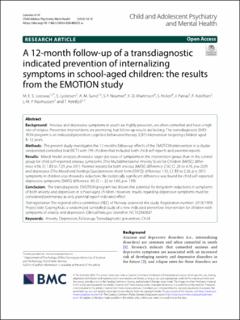| dc.contributor.author | Løvaas, Mona Elisabeth S | |
| dc.contributor.author | Lydersen, Stian | |
| dc.contributor.author | Sund, Anne Mari | |
| dc.contributor.author | Neumer, Simon-Peter | |
| dc.contributor.author | Martinsen, Kristin Dagmar | |
| dc.contributor.author | Holen, Solveig | |
| dc.contributor.author | Patras, Joshua | |
| dc.contributor.author | Rasmussen, Lene-Mari Potulski | |
| dc.contributor.author | Adolfsen, Frode | |
| dc.contributor.author | Reinfjell, Trude | |
| dc.date.accessioned | 2020-04-28T11:40:29Z | |
| dc.date.available | 2020-04-28T11:40:29Z | |
| dc.date.created | 2020-04-17T11:49:06Z | |
| dc.date.issued | 2020 | |
| dc.identifier.issn | 1753-2000 | |
| dc.identifier.uri | https://hdl.handle.net/11250/2652766 | |
| dc.description.abstract | Background
Anxious and depressive symptoms in youth are highly prevalent, are often comorbid and have a high rate of relapse. Preventive interventions are promising, but follow-up results are lacking. The transdiagnostic EMOTION program is an indicated preventive cognitive behavioral therapy (CBT) intervention targeting children aged 8–12 years.
Methods
The present study investigates the 12 months follow-up effects of the EMOTION intervention in a cluster randomized controlled trial (RCT) with 795 children that included both child self-reports and parental reports.
Results
Mixed model analyses showed a larger decrease of symptoms in the intervention group than in the control group for child self-reported anxious symptoms (The Multidimensional Anxiety Scale for Children (MASC) difference 4.56, CI 1.83 to 7.29, p = .001). Parental reports for both anxious (MASC difference 2.50, CI .26 to 4.74, p = .029) and depressive (The Mood and Feelings Questionnaire-short form (SMFQ) difference 1.55, CI .83 to 2.26, p ≤ .001) symptoms in children also showed a reduction. No statistically significant difference was found for child self-reported depressive symptoms (SMFQ difference .69, CI − .22 to 1.60, p = .139).
Conclusion
The transdiagnostic EMOTION program has shown the potential for long-term reductions in symptoms of both anxiety and depression in school-aged children. However, results regarding depressive symptoms must be considered preliminary as only parental report indicated effect.
Trial registration The regional ethics committee (REC) of Norway approved the study. Registration number: 2013/1909; Project title: Coping Kids: a randomized controlled study of a new indicated preventive intervention for children with symptoms of anxiety and depression. ClinicalTrials.gov Identifier; NCT02340637. | en_US |
| dc.language.iso | eng | en_US |
| dc.publisher | BMC (part of Springer Nature) | en_US |
| dc.rights | Navngivelse 4.0 Internasjonal | * |
| dc.rights.uri | http://creativecommons.org/licenses/by/4.0/deed.no | * |
| dc.title | A 12-month follow-up of a transdiagnostic indicated prevention of internalizing symptoms in school-aged children: The results from the EMOTION study. | en_US |
| dc.type | Peer reviewed | en_US |
| dc.type | Journal article | en_US |
| dc.description.version | publishedVersion | en_US |
| dc.source.volume | 14 | en_US |
| dc.source.journal | Child and Adolescent Psychiatry and Mental Health (CAPMH) | en_US |
| dc.identifier.doi | 10.1186/s13034-020-00322-w | |
| dc.identifier.cristin | 1806746 | |
| dc.description.localcode | © The Author(s) 2020. This article is licensed under a Creative Commons Attribution 4.0 International License, which permits use, sharing, adaptation, distribution and reproduction in any medium or format, as long as you give appropriate credit to the original author(s) and the source, provide a link to the Creative Commons licence, and indicate if changes were made. | en_US |
| cristin.ispublished | false | |
| cristin.fulltext | original | |
| cristin.qualitycode | 1 | |

